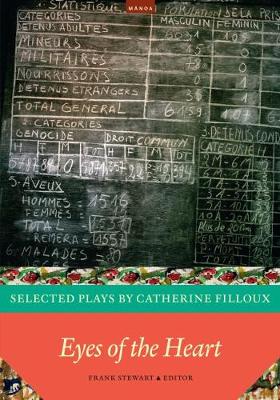Manoa
1 total work
A collection of six plays by award-winning playwright Catherine Filloux: Eyes of the Heart; Kidnap Road; Lemkin’s House; Mary and Myra; Selma ’65; and Silence of God. National and international settings. Subjects include key figures in the history of human and civil rights; genocide; crimes against women during armed conflicts; international human rights law; U.S. Civil Rights Movement; and Woman’s Suffrage.
Several real-life figures appear in Filloux’s plays: Ingrid Betancourt, a woman politician in Colombia who campaigned for presidency and was kidnapped by FARC revolutionary forces in 2002; Myra Bradwell, first US woman lawyer; political activist, instrumental in getting Mary Todd Lincoln released from an insane asylum and her inheritance restored; Raphael Lemkin, originator of the term genocide, activist lawyer against international war crimes; nominee for the Nobel Peace Prize; Mary Todd Lincoln, widow of President Abraham Lincoln; Viola Liuzzo, civil rights activist murdered by the KKK; only white woman killed during the 1960s Civil Rights Movement; Pol Pot, head of the Khmer Rouge, responsible in the 1970s for the deaths of nearly two million Cambodians; William Proxmire, senator who advocated for the U.S. adoption of the International Convention for the Prevention and Punishment of the Crime of Genocide.
Several real-life figures appear in Filloux’s plays: Ingrid Betancourt, a woman politician in Colombia who campaigned for presidency and was kidnapped by FARC revolutionary forces in 2002; Myra Bradwell, first US woman lawyer; political activist, instrumental in getting Mary Todd Lincoln released from an insane asylum and her inheritance restored; Raphael Lemkin, originator of the term genocide, activist lawyer against international war crimes; nominee for the Nobel Peace Prize; Mary Todd Lincoln, widow of President Abraham Lincoln; Viola Liuzzo, civil rights activist murdered by the KKK; only white woman killed during the 1960s Civil Rights Movement; Pol Pot, head of the Khmer Rouge, responsible in the 1970s for the deaths of nearly two million Cambodians; William Proxmire, senator who advocated for the U.S. adoption of the International Convention for the Prevention and Punishment of the Crime of Genocide.
